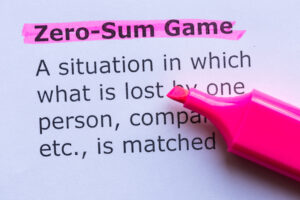Let Go of the Zero-Sum Fallacy and Enjoy Others' Good Fortune
By Art Carden


Karl Marx thought exchange was mutual swindling. It is not; an exchange means both parties are better off. Competition means more and more of the gains from innovation have gone not to the innovators themselves or to grasping producers but to consumers.
Exchanges hurt no one—at least, as Paul Heyne points out, no one with a right to be consulted.1 You have as much right to stop someone from spending the wrong way as you have to stop them from kissing or praying the wrong way. And, of course, some people will point with at least some justice to the problems of inequality. However, inequality is not morally important. The propagandist Danilov was right in the 2001 movie Enemy at the Gates. There will always be someone with something we want but don’t have. Envy we will always have with us. The beauty of exchange, again, is that it makes both people better off. If it improves their position relative to you, then the right response is congratulations rather than resentment.
Aleksandr Solzhenitsyn said that the line dividing good from evil runs through the heart of every man. It’s on the evil side of the line from which we get the impulse to resent the colleague who has published two articles when we have only published one, or the colleague who has more citations than we have, particularly when we want to tell some sort of story about how that could have been us had things only been different. First, I can’t imagine that the object of my resentment’s life has been perfect by any stretch of the imagination. Second, we need to own the consequences of our choices. For just about every “if only…” I can point to when I want to be upset about what I don’t have, I can point to deliberate choices I made in the past, many of which recognized and explicitly considered the trade-offs. The ones that didn’t were either exercises in immaturity or ignorance. Repeat after me: the right response to another’s good fortune is congratulations, not grief. We need to learn to say, “I’m happy for you” and mean it instead of saying “I’m happy for you” out loud and then muttering “you blackguard” under our breath.
In Leave Me Alone and I’ll Make You Rich,2 Deirdre McCloskey and I explain that the Bourgeois Deal is the appropriate deal for a society of adults. It is a deal that respects and honors others as people bearing the image of God, or at any rate as people who are blessed with dignity and liberty simply because they are people. It is not the Blue Blood Deal governing a society of masters and slaves. It is the deal fit for C.S. Lewis, for example, who notes that he has seen people fit only to be slaves but no one fit to be master.
Envy has been defined as “grieving the good of others,” and in an excellent analysis,3 Jordan Ballor and Victor Claar explain its pernicious effects. It is easy to default to the idea that someone who has more or better than we do has made some kind of deal with the devil. It’s a natural human impulse, and it’s common not only in humans but in all other primates, as well. It’s an impulse to be resisted.
In Speaker of the Dead, the second book of Orson Scott Card’s Ender Quartet, a peculiar group of creatures called the pequeninos have a fundamentally zero-sum view of the world. One asks what he has gained if he and another get the same benefit without noticing that the relevant comparison is with oneself the day before, not with another who (again) might have something we don’t. Where we are now is, in a lot of respects, the result of having won the historical and geographic lottery as well as the accretion of a lifetime’s worth of decisions—some good, some bad, some evil, some virtuous. Importantly, we don’t lift ourselves up by pulling one another down, and as Booker T. Washington has pointed out, you cannot keep someone down in a ditch without climbing down to lay on top of him.
There are a lot of candidates for the most powerful force in the universe. There’s love. There’s the strong nuclear force. There’s compound interest. Perhaps a better candidate is division of labor, which makes us more productive by giving us opportunities to specialize and exchange—and to thereby get more with the sweat of our brow.
In a famous example in The Wealth of Nations, Adam Smith tells us that we get our dinner from the butcher, the baker, and the brewer not by appealing to their humanity or to our need—they are, after all, surrounded by people with unlimited need, and if “compassion fatigue” exists, then we are limited in our ability to be purely and perfectly altruistic all the time. We appeal to others’ interests, and to their self-love—to the fact that we are willing to help them achieve their goals if they are willing to help us achieve ours. By specializing in butchering, the butcher can get more beef, more bread, and more beer. By specializing in baking, the baker can get more bread, more beef, and more beer. By specializing in brewing, the brewer can get more beer, more bread, and more beef. Their gains come in addition to the gains they create for others and not “instead of” or “at the expense of.”
As Thomas Sowell put it: people live on real income, not on income shares. With respect to the ability to get the necessaries—food, clothing, and our daily bread—it is better to have a small fraction of a large sum than a large fraction of a small sum.
It is curious that for all its emphasis on making people better off by their own preferences and correcting cognitive biases, behavioral economists and psychologists have paid so little attention to envy. Indeed, they haven’t so much ignored it as they have sanctified it even though it is agreed to be the kind of thing that corrodes the soul. When I feel those twinges of resentment at people who have what I don’t—a nicer car, a bigger house, a higher salary—I have to check myself and note that I’m making more than enough to meet my needs and to to lead a flourishing life. It’s vicious, not virtuous, for me to think myself cheated just because someone else has a little more than I do.
It’s true that the people around me who have more might have it because of horrible things they’ve done. However, we’ve all done horrible things (“well, maybe not that horrible,” I say, and I hear you saying) that have us better positioned than we otherwise would have been had we started from Year Zero and all lived lives of perfect virtue. We and our ancestors have also been the perpetrators and victims of innumerable outrages.
Preoccupation with those outrages leads to a moral dead end, though. First, it encourages us to think of people as abstractions, with one group having wronged another group and with the wrong being compressed in space-time to a perpetual now. I cannot help but wonder if this is popular in part because it relieves people of the burden of thinking. Second, it encourages the Intersectional Oppression Olympics where everyone is fighting to claim the mantle of Most Oppressed. Not only is such an argument costly—we could actually be making things and creating beauty instead of arguing—it’s morally corrosive. It might be attractive, though, because it relieves us of the obligation to treat one another as moral equals. If the world sorts semi-neatly into oppressors and oppressed, then “equity” demands political inequality where moral exemplars like ourselves are created equal but are more equal than the people around us.
For more on these topics, see
 Stephen Kotkin on Solzhenitsyn. EconTalk.
Stephen Kotkin on Solzhenitsyn. EconTalk.- “Wanting the Worst,” by Peter W. Wood. Law and Liberty, Oct. 16, 2019.
- “Behavioral Versus Free Market Economics,” by Leonidas Zelmanovitz. Library of Economics and Liberty, Jan. 2, 2023.
The zero-sum fallacy has deep psychological roots. So does its offspring, envy. As societies have slowly, reluctantly, and incompletely embraced the Bourgeois Deal, it has become less relevant to, and less descriptive of, our day-to-day affairs. To the extent that we have resisted our envious impulses and left other people alone, even when they have enjoyed things we don’t have, we have freed them up to make the rest of us rich.
Footnotes
[1] Carden, Art. “Are Economists Basically Immoral?” AIER, October 26, 2019.
[2] McCloskey, Deirdre Nansen and Art Carden. Leave Me Alone and I’ll Make You Rich. Chicago: The University of Chicago Press, 2020. See also Peter J. Boettke’s Liberty Fund Economics Book Club: Discussion with Art Carden about Leave Me Alone and I’ll Make You Rich. EconLog, March 24, 2022.
[3] Ballor, Jordan J. and Claar, Victor V., “Envy in the Market Economy: Sin, Fairness, and Spontaneous (Dis)Order” (November 4, 2013). Faith & Economics 61/62 (Spring/Fall 2013): 33-53.
*Art Carden is Assistant Professor of Economics at Samford University in Birmingham, AL, a Senior Research Fellow with the Institute for Faith, Work, and Economics in McLean, VA, a Research Fellow with the Independent Institute in Oakland, CA, and a Senior Fellow with the Beacon Center of Tennessee.
For more articles by Art Carden, see the Archive.
